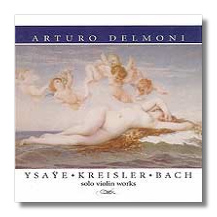
The Internet's Premier Classical Music Source
Related Links
- Latest Reviews
- More Reviews
-
By Composer
-
Collections
DVD & Blu-ray
Books
Concert Reviews
Articles/Interviews
Software
Audio
Search Amazon
Recommended Links
Site News
 CD Review
CD Review
Ysaÿe, Kreisler, Bach

Solo Violin Works
- Eugène Ysaÿe: Sonata for Solo Violin, Op. 27, #2 "Obsession"
- Fritz Kreisler: Recitativo and Scherzo, Op. 6
- Johann Sebastian Bach: Partita #2 in D minor, BWV 1004
Arturo Delmoni, violin
Recorded in December of 1988 in Santa Barbara, California, by Kavichandran Alexander for Water Lily Acoustics
John Marks Records JMR14 1996 ADD 48:28
When listening to this recording for the first time I was immediately struck by the sensitivity and grace of the performance, and by the warm and realistic sound of the recording. This is a truly exceptional disc.
Arturo Delmoni plays with much passion, taste, and understanding. He is technically first rate and it is difficult to understand why he is not better known. Delmoni and his instrument, a 1780 Guadagnini with a warm, pleasant sound, are very well presented here. The setting is a small hall, actually a chapel, with an ideal acoustic. The reverberation time is about one second and it is well damped, adding a fine bloom to the sound. The exceptionally clear, close-up recording presents all the fine details of the performance and the full range of timbres produced by the violin.
The program opens with the second of Ysaÿe's six sonatas for solo violin. The piece begins with a quote from the first bar of the Bach Partita in E Major, so the recital is planned as a neat cycle. The sonata continues with more excerpts from Bach, and variations on these, giving the impression of a violinist warming up by playing the most difficult passages of a recital. The second of the four movements is a quiet "Malinconia" and the third is a "Danse des Ombres" with a wonderful, rustic feel. It has a distinct American accent here, almost bluegrass – an interesting contrast to Gidon Kremer's drier Slavic version. The finale, "Les Furies," is reminiscent of Paganini's Caprices with added modern-sounding dissonances and timbres. Some passages are played close to the bridge for a very thin tone. Delmoni handles this difficult showpiece in the best virtuoso manner.
The Kreisler piece is brief (a little over five minutes) and in two movements. The first is dark and moody, slow and expressive, and the second is brighter and faster, more showy, and mostly in double stops. This piece exhibits less of a retrospective style than most of Kreisler's better known compositions, which he ascribed to other composers. It provides an interlude between the more serious works.
The opening movements of the D minor Partita are presented with gravity and a good sense of the long phrases used by Bach.
The high point of the whole program must be the great Chaconne that ends the Partita. In this set of variations on a four-bar theme Bach presents and develops a vast array of moods and ideas and demands an equally broad range of technique from the performer, ranging from the most delicate pianissimo to full chords and triple-stops. (The greatest violinist of our day, David Oistrakh, never felt fully equal to the task and never recorded this work.)
The Chaconne is full of contrasts and shifts of mood and the best interpretations are the ones that handle these transitions well. Delmoni takes much of the piece at a deliberate tempo and manages the drama well, building considerable tension in the last sections. His tone here is rich, and sometimes astringent, giving very effective coloration.
Overall this is a very impressive release, one of the best violin discs I've heard in years. Delmoni is a brilliant and charismatic performer with a very personal and likable style. And this recording is of demonstration quality, one of the most realistic representations of a performance you're likely to hear.
I am grateful to John Marks for making this material available. The engineer Kavi Alexander is a legend in the small world of high-end audio, and his own label never achieved the distribution it deserved on the basis of quality. Now another small label with a major distributor will bring his recordings to a wider audience.
Copyright © 1997, Paul Geffen


















